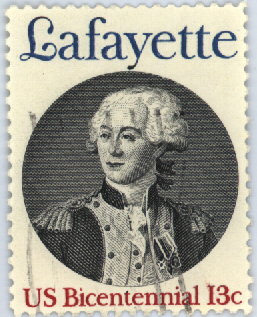FRtR > Biographies >
Alexander Hamilton > A Biography 1755-1804
A Biography of Alexander Hamilton (1755-1804)
The Arnold/Andre Affair (September 1780)
< Previous Chapter *
Next Chapter >
*** Quote ***
The military campaign of 1780 brought victories at sea for John Paul Jones,
but saw defeats on land as Clinton captured Charleston, and Cornwallis got the
better of Horatio Gates at Camden in a devastating defeat for the American
army. Although the arrival of Rochambeau's army in July brought hope for
the beleaguered army, one event was to dangerously shake the foundations of
the American cause and bring the already tense relationship between Hamilton
and Washington to the breaking point.
On the way back to headquarters from meetings with the French commanders,
Washington and Hamilton were due to stop at West Point, commanded by major
general Benedict Arnold. They found upon arrival at the commander's
headquarters that Arnold had defected to the British after having agreed to
turn over West Point, one of the most important American fortifications, to
Sir Henry Clinton.
Fortunately, resourceful American soldiers routed Clinton's agent, Major
John Andre, on his way to deliver the plans. However, the damage had been
done within the army. Arnold had been a respected commander under Gates,
whose bravery in the battles of Ridgefield and Saratoga made him a hero.
Severely wounded at Saratoga, Washington had put him in command at West Point.
Washington, now uncertain of whom he could trust, dissolved into one of his
infamous towering rages. Unable to get his hands on Arnold, he exorcised his
anger on those around him, and especially Andre, who was in American custody.
Washington decided that Andre was to be hung as a spy, despite the fact that
he was an officer and as such should be given the "gentleman's"
execution by shooting.
Andre's dying wish was to be shot. Hamilton, who had met with Andre
several times, and like many of the Americans was impressed with the young
British officer's "elegance of mind and manners," appealed to
Washington on Andre's behalf. Washington was unmoved. Andre had been
apprehended in civilian dress and would be hung as a spy. Discussion over.
Andre was hung on October 2, 1780.
 Disillusioned with Washington, and doubly determined to get away from
headquarters and improve upon his "military reputation," Hamilton
began in earnest his own campaign to acquire a field command. If anyone could
pull the General's heartstrings, Hamilton knew it was Lafayette, so he
enlisted the Frenchman to appeal on his behalf. But even the Marquis'
intervention did nothing to sway the General, who maintained rightly that
elevating Hamilton over higher ranking officers might arouse resentments;
and "if an accident should happen to me," (Hamilton wrote to
Washington in November) "in the present state of your family, you would
be embarrassed for the necessary assistance." The General was fearful
that his most valuable assistant would get killed.
Disillusioned with Washington, and doubly determined to get away from
headquarters and improve upon his "military reputation," Hamilton
began in earnest his own campaign to acquire a field command. If anyone could
pull the General's heartstrings, Hamilton knew it was Lafayette, so he
enlisted the Frenchman to appeal on his behalf. But even the Marquis'
intervention did nothing to sway the General, who maintained rightly that
elevating Hamilton over higher ranking officers might arouse resentments;
and "if an accident should happen to me," (Hamilton wrote to
Washington in November) "in the present state of your family, you would
be embarrassed for the necessary assistance." The General was fearful
that his most valuable assistant would get killed.
On the sympathetic advice of Lafayette, ("I know the general's
friendship and gratitude for you, My Dear Hamilton, both are greater than you
perhaps imagine"), Hamilton acquiesced and remained at headquarters
scratching out reams of official correspondence, countenancing the
ever-stressed Washington's increasingly snappish ways, and letting his
dissatisfaction simmer until it reached the boiling point in February of 1781.
< Previous Chapter *
Next Chapter >
 Disillusioned with Washington, and doubly determined to get away from
headquarters and improve upon his "military reputation," Hamilton
began in earnest his own campaign to acquire a field command. If anyone could
pull the General's heartstrings, Hamilton knew it was Lafayette, so he
enlisted the Frenchman to appeal on his behalf. But even the Marquis'
intervention did nothing to sway the General, who maintained rightly that
elevating Hamilton over higher ranking officers might arouse resentments;
and "if an accident should happen to me," (Hamilton wrote to
Washington in November) "in the present state of your family, you would
be embarrassed for the necessary assistance." The General was fearful
that his most valuable assistant would get killed.
Disillusioned with Washington, and doubly determined to get away from
headquarters and improve upon his "military reputation," Hamilton
began in earnest his own campaign to acquire a field command. If anyone could
pull the General's heartstrings, Hamilton knew it was Lafayette, so he
enlisted the Frenchman to appeal on his behalf. But even the Marquis'
intervention did nothing to sway the General, who maintained rightly that
elevating Hamilton over higher ranking officers might arouse resentments;
and "if an accident should happen to me," (Hamilton wrote to
Washington in November) "in the present state of your family, you would
be embarrassed for the necessary assistance." The General was fearful
that his most valuable assistant would get killed.